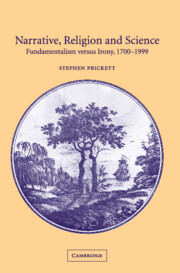Book contents
- Frontmatter
- Contents
- Acknowledgements
- Introduction: Arthur Dent, Screwtape and the mysteries of story-telling
- 1 Postmodernism, grand narratives and just-so stories
- 2 Newton and Kissinger: Science as irony?
- 3 Learning to say ‘I’: Literature and subjectivity
- 4 Reconstructing religion: Fragmentation, typology and symbolism
- 5 The ache in the missing limb: Language, truth and presence
- 6 Twentieth-century fundamentalisms: Theology, truth and irony
- 7 Science and religion: Language, metaphor and consilience
- Concluding conversational postscript: The tomb of Napoleon
- Bibliography
- Index
Concluding conversational postscript: The tomb of Napoleon
Published online by Cambridge University Press: 12 November 2009
- Frontmatter
- Contents
- Acknowledgements
- Introduction: Arthur Dent, Screwtape and the mysteries of story-telling
- 1 Postmodernism, grand narratives and just-so stories
- 2 Newton and Kissinger: Science as irony?
- 3 Learning to say ‘I’: Literature and subjectivity
- 4 Reconstructing religion: Fragmentation, typology and symbolism
- 5 The ache in the missing limb: Language, truth and presence
- 6 Twentieth-century fundamentalisms: Theology, truth and irony
- 7 Science and religion: Language, metaphor and consilience
- Concluding conversational postscript: The tomb of Napoleon
- Bibliography
- Index
Summary
We began from the now popular idea that science, like theology, and indeed like most other ways of knowing, is really in the business of telling stories about the world. As we have seen, such a notion has passed from shocking to respectable, and finally to cliché, in a relatively short period in the last quarter of the twentieth century. A millennium article by the veteran Jesuit, Walter J. Ong, cites a whole clutch of recent publications dealing with science and religion as ‘stories’ of the universe. There are, however, dangers in such a dramatic reinstatement of narrative as, if not ‘queen of the sciences’, at least a kind of quasi-omniscient Jeeves-like lab assistant.
It is not the danger of reducing all knowledge to a single medium. That term ‘reducing’ is a weasel-word. Anyone who has read so far should be aware that so far from there being any reduction in such a highly unlikely consilience, there is a considerable enhancement of our understanding of the world in recognizing the part played by narrative in every description of it – and no less in analysing such narratives with the techniques and insights created by the professionals: literary critics and their ilk. Nor is it the danger of claiming (like Rorty) that narrative is all there is. Such an over-simplification is as crude as the assumption that all words correspond to real entities; both are patently self-defeating.
- Type
- Chapter
- Information
- Narrative, Religion and ScienceFundamentalism versus Irony, 1700–1999, pp. 256 - 263Publisher: Cambridge University PressPrint publication year: 2002

